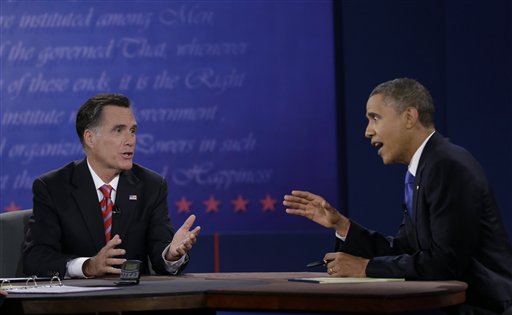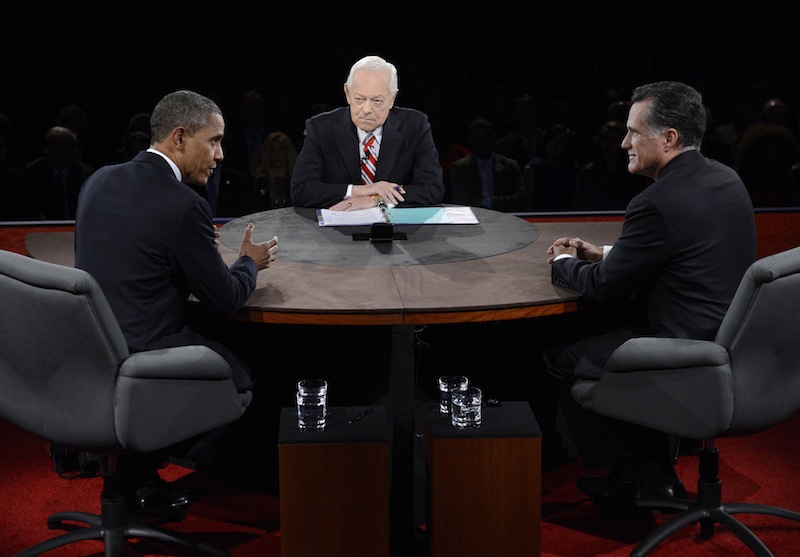BOCA RATON, Fla. — President Obama and Republican Mitt Romney spent their final debate Monday circling the globe’s hot spots as they clashed over the merits of diplomacy and brinkmanship in Libya, Israel, Iran, the Middle East and other volatile areas.
But they also managed to get in digs at their opponents’ economic plans.
The topic of the 90-minute clash at Lynn University, their third and final debate, was billed as foreign policy, which polls show is not a major concern of most Americans as they prepare to vote Nov. 6.
About one-third of the way through the debate, Obama and Romney turned the talk to the economy, the issue that is overwhelmingly most on voters’ minds.
A strong America, Romney said, must have a strong economy. “For us to be able to promote those principles of peace requires us to be strong,” he said. “And that begins with a strong economy here at home. Unfortunately, the economy is not stronger.”
Obama, too, wanted to talk about the economy and said his administration has ended the war in Iraq and put the U.S. in a position to rebuild. And he charged that Romney would pursue “wrong and reckless policies.”
The president was the aggressor from the start, charging that Romney has “praised George Bush as a good economic steward and Dick Cheney as somebody who shows great wisdom and judgment. And taking us back to those kinds of strategies that got us into this mess is not the way that we are going to maintain leadership in the 21st century.”
On foreign policy, Obama cast Mitt Romney as a defense and foreign policy amateur, accusing him of naivete and shifting positions that would undermine the country’s well-being at home and its security abroad.
“The problem is … on a whole range of issues,” Obama said in one biting exchange, “you’ve been all over the map.”
Romney took a more temperate tone but nevertheless accused the president of repeatedly apologizing for the country abroad – something the president vigorously denied – and failing to stand up for its ideals, especially during the revolutionary Arab Spring.
“We have to stand by our principles,” Romney said. “But unfortunately, nowhere in the world is America’s influence greater today than it was four years ago.”
The debate’s main purpose was to give voters a measure of how each candidate would act as commander in chief, and both men tried to portray themselves as resolute and reasonable.
The two men spent much of their time in broad agreement on a host of issues, including the nation’s deep commitment to Israel, the plan to remove American military troops from Afghanistan at the end of 2014, the policy of sending drones to kill enemies abroad and sanctions against Iran.
But there was friction. Obama said Romney was tied to policies of the past. “Every time you’ve offered an opinion, you’ve been wrong,” the president said.
What’s needed is “strong, steady leadership,” Obama said. He offered an impassioned defense of why it was important to track down and kill Osama bin Laden.
Referring to a girl whose father was killed in the Sept. 11, 2001, terrorist attacks, the president said: “When we do things like that – when we bring those who have harmed us to justice – that sends a message to the world and it tells Peyton that we did not forget her father. And I make that point because that’s the kind of clarity of leadership, and those decisions are not always popular.”
Romney labeled his strategy “straightforward.” The major strategy, he said, is to “make sure we go after leaders of these various anti-American groups and these jihadists.”
“But we can’t kill our way out of this mess,” he said. “We’re going to have to put in place a very comprehensive and robust strategy to help the – the world of Islam and other parts of the world, reject this radical violent extremism, which is – it’s certainly not on the run.”
Obama cited his record, saying al-Qaida’s leadership had been “decimated” and describing how his policies have allowed the United States to rebuild alliances and combat future threats.
Some of the other topics at Monday’s debate:
• Military spending: One way to show American strength, Romney has argued, is to beef up military capability. Before leaving for a pre-election recess, Congress agreed to set defense spending for fiscal 2013, the 12-month period that began Oct. 1, at about $519.9 billion, about the same as last year.
Automatic cuts planned to begin in January would shave about 9 percent to 10 percent from most Pentagon programs this year and $500 billion over 10 years. Romney says he’ll stop those cuts, but does not say specifically how he’d do that without increasing federal deficits.
Obama noted that the automatic cuts are “not something I proposed” and vowed they would not happen.
Romney reiterated his complaint that under Obama, the Navy is at its lowest number of ships since 1916.
Obama ridiculed the remark, saying U.S. military needs have changed. “Well, governor, we also have fewer horses and bayonets, because the nature of our military’s changed,” Obama said. “We have these things called aircraft carriers, where planes land on them. We have these ships that go underwater, nuclear submarines.”
• Iran: Obama vowed that as long as he’s president, Iran will not get a nuclear weapon. “A nuclear Iran is a threat to our national security and it’s a threat to Israel’s national security,” he said. Romney has said much the same thing.
“I would tighten those sanctions,” Romney said.
Aside from putting greater stress on threatening military action, Romney hasn’t articulated a plan for dealing with Iran’s nuclear program that’s much different from Obama’s approach. That policy combines tightening sanctions and keeping a military option open while pushing for a diplomatic deal under which Iran would halt its enrichment of uranium.
• Iraq and Afghanistan: Romney has echoed Obama’s goal of withdrawing combat troops from Afghanistan by the end of 2014, but he said he’d let military commanders determine the pace. And Republicans have criticized Obama for failing to secure an agreement with Iraqi leaders to keep some peacekeeping forces in that country.
• Israel: “I will stand with Israel if it is attacked,” Obama pledged. “If Israel’s attacked, we have their back,” Romney said.
Monday’s debate was significant as the last chance for voters to see the two presidential hopefuls standing side-by-side and engaging in a relatively free-flowing, unscripted exchange. It also represented the last major chance the candidates had to appeal to voters who have yet to make up their minds and, perhaps more importantly, to excite their supporters and motivate them to turn out for the Nov. 6 election.�
Send questions/comments to the editors.




Comments are no longer available on this story